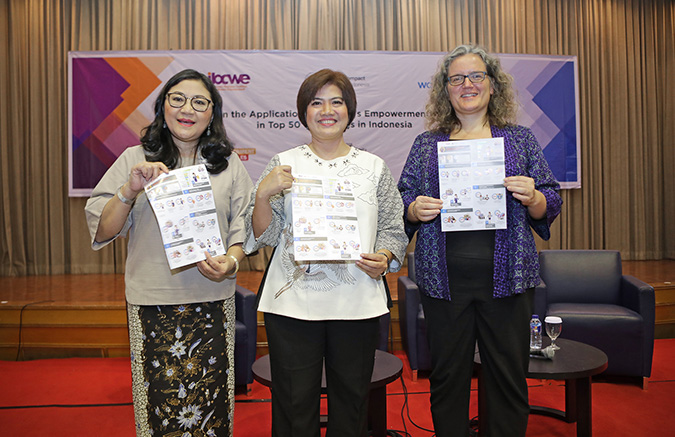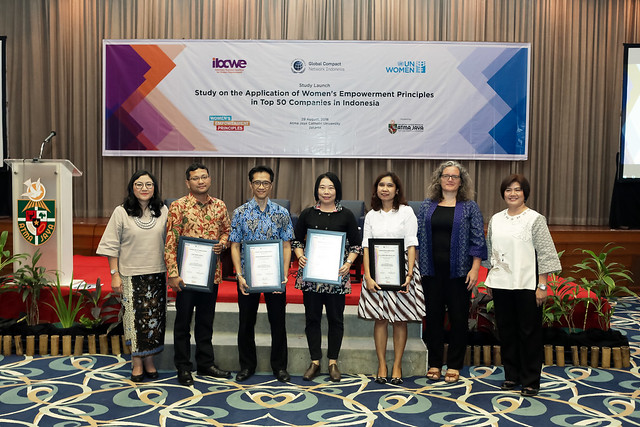First study on the application of the Women’s Empowerment Principles finds gaps and progress in Indonesia
Date:
Author: Radhiska Anggiana
Jakarta, Indonesia — In August 2018, the Indonesia Business Coalition for Women’s Empowerment (IBCWE), Indonesia Global Compact Network (IGCN) and UN Women launched the results of a study on the application of the Women’s Empowerment Principles (WEPs). These seven steps aim to help companies bolster gender equality and women’s position in the workplace, marketplace and community.
The study provides a snapshot of the initiatives being implemented to empower women in the top 50 companies in Indonesia across the WEPs categories: corporate leadership; human rights and nondiscrimination; health and safety; education and training; enterprise development; community leadership and engagement; and transparency, measuring and reporting.
At the time of the study, only 11 Indonesian companies were WEPs signatories, two of which were among the top 50 surveyed. Since then, six new companies signed on to the WEPs on 24 September.

“Investing in women is not only the right thing to do but also a smart move for businesses and the economy,” said UN Women Representative Sabine Machl. “Achieving gender equality in the workplace is still a challenge. The Women’s Empowerment Principles identify gaps and opportunities to tackle inequality. They drive inclusion and empowerment. Through this study, we hope to motivate companies to undertake concrete action and more commitments to join forces in driving gender equality in the workplace, marketplace and community.”
The study revealed that companies are aware of the importance of equal opportunities, inclusion of women and non-discrimination. It found that 84 per cent of the companies surveyed already have women on their board of executives and about 68 per cent have facilities and/or policies specifically targeting women employees. Most (94 per cent) have zero-tolerance policies towards violence and harassment.
Despite good initiatives to implement gender equality and women’s empowerment in the workplace, marketplace and community, the report recognizes that a lot of work remains to be done. In the workplace, although most companies surveyed already have women on their board of executives, the average percentage of women on boards, compared to total board members, is just 28 per cent. In the marketplace, the report notes a lack of awareness of the importance of women’s empowerment in enterprise development, supply chain and marketing. Only 22 per cent of the companies surveyed conduct assessments on the differential impacts of their products or services on women and men when developing products and/or services. In the community, some participating companies have not yet considered gender as a significant factor when developing community engagement programmes.
“Empowering women in business should not be seen as an obligation, but as part of a strategy that supports businesses within their core and value chain. Empowered women are believed to bring more benefit to the business,” said Josephine Satyono, IGCN Executive Director. “Data shows that companies with the most women managers turn a 34 per cent higher profit. Research from McKinsey in 2014 also highlights the fact that companies with more women in senior management functions score higher in all dimensions of organizational effectiveness. However, very few have actually defined strategies to engage and empower women.”The study highlighted the importance of continuously raising the issue of women’s empowerment to maintain awareness in the long-term, as well as suggesting concrete actions to improve gender equality. Recommendations include the need to: identify the different challenges, needs and interests of female and male employees; discuss these needs with the employees and initiate the measures to address them; and develop internal campaigns and/or programmes to support gender equality and prevent gender bias in the workplace, marketplace and community.
Anika Faisal, Chairperson of Supervisory Board of IBCWE said: “Gender equality is still a major issue that continues to be the centre of the public conversation. Many companies have not been able to implement gender equality in the workplace. Government is not the only party that is obliged to advance gender equality; this requires a joint effort, including from the private sector.”
This report aims to help companies and organizations to gain a clear understanding on the state of women’s empowerment in the workplace, marketplace and community. In addition, the report helps to raise awareness of the WEPs and how they can provide guidance to help companies integrating a gender perspective into their programmes, policies and reporting. Authors hope the study will encourage more companies to take steps to improve their workplaces for women and join the WEPs initiative.
